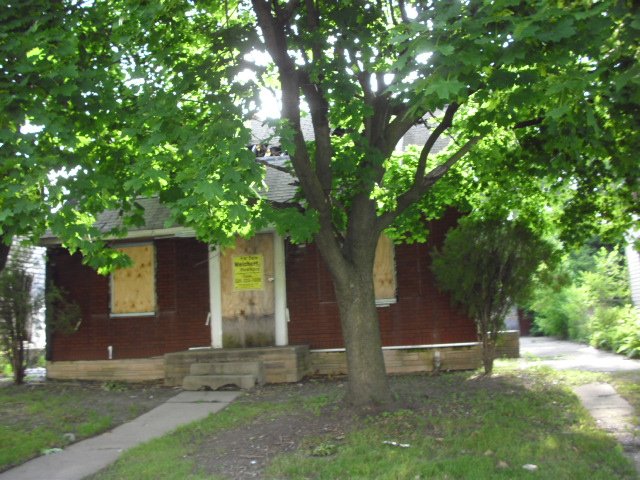Welcome to Recycle Friday. This week, a post that originally ran on LenPenzo.com, updated for posterity.

If this page appears in your mortgage document, RUN. Also, mortgages shouldn't have sines and tangents in them
Should you walk away from your mortgage just because your home depreciated?
So you refinanced. Or bought too much house. You divided the mortgage payments by your income, and decided you could swing something a few percentage points higher than the recommended 25–33 because the market was rising and your house would make you rich just by existing.
You relied on speculation as an investment strategy (not even your own speculation, but other people’s.) But your house got cheaper, maybe cheaper than what you bought it for. That’s called “losing money on an investment,” which happens all the time, but people think it oughtn’t when your bedroom and kitchen are part of the investment.
The market might bounce back. If you’re 7 years in, lots can happen in the remaining 23 on a 30-year mortgage.
When you lose money on a stock, your brokerage account might get wiped out, but no one will see the evidence of this except you. Owe more than your vehicle is worth, and it might get repoed. Fine, tell people you sold it and always wanted to ride the bus instead. But stop making payments on a house, and there’s a letter from the constable on the door, maybe some yellow tape involved – hard to keep that quiet from the neighbors. Also, people getting forcibly removed from “their” houses (it’s yours and not the bank’s only after you pay the entire mortgage) make for striking photo and political opportunities. After all, bankers are evil. Meanwhile, it’s the working stiffs just trying to make ends meet who get raked over the coals. (Wow, a sentence composed entirely of clichés. Mike Lupica approves.)
Some people who make enough to cover the mortgage dump the house anyway – the strategic default. They assume investment values only move in one direction. According to Experian, that includes 20% of defaulters.
This is hiding behind the law. Stop making payments, and it’s not like you’ll be evicted that week. It takes months, even years. The idea here is to take the mortgage payments and put them toward, say, your credit card balance, figuring the lender will gladly renegotiate a contract you signed in order to get some sort of return on its investment.
Some borrowers think this is fine because if the lender kicks you out, it’ll be tough to sell the house to someone else in a down market anyway. The lender at least wants the house to stay lived in.
This is nonsense. Strategic defaults hurt everyone.
A strategic default does to your credit score what Michael Vick did to underperforming fighting dogs. You’ll never be able to borrow either a) again, or b) until Congress and the White House decide that so many people need to improve their credit scores that it just wouldn’t be fair to let some insidious little 3-digit numbers have such power over those people’s lives.
What’s the solution? Well, no politician of either party wants the other accusing him or her of standing by while old ladies and cripples are being kicked out of “their” houses. The government would then essentially renegotiate mortgage contracts, setting caps on future ones and insisting the lenders take less. Under this type of forced renegotiation, the borrowers don’t even have to sack up and face the lenders themselves.
Besides, co-workers, professors, and the blonde lady on TV say defaulting is fine. And for PR reasons, lenders are hunting down deficient borrowers about as aggressively as the feds go after illegal immigrants.
Say you walk away from your mortgage, mail your keys to your lender, then rent somewhere. Your now-former neighbor follows, then a third. No matter how swank a neighborhood you deserted, the lawns turn brown and the pools green because no one’s living in the houses. Which reduces the value of the remaining houses. Now the people who stayed behind and haven’t (yet) defaulted watch their homes’ values decline. Which means they’ll likely owe more than their houses are worth, making it more likely that those folks will default. Continue like this, and you end up with…Detroit.
When you declare bankruptcy, you can renegotiate to protect yourself from creditors. But strategically defaulting is the opposite – you keep all your assets except the house and mortgage.
So what to do? Four choices:
1. Man up, economize and make your payments. You’re obligated to the lender, yourself (to preserve your credit), any kids of yours (unless you don’t think you need to set an example) and society. If you steal from your lender, it doesn’t directly affect the rest of us, but it makes civilization incrementally more difficult to live in—the broken window theory.
You don’t like that answer? It’s a house, for crying out loud. You need somewhere to live. No matter how much value it loses, it’s still better than renting and never building a dime of equity. Stop assuming that because your $100,000 house lost 10% of its value last year, it’ll lose a similar amount next year and by 2022 will be worth -$10,000.
2. Short sale. If you know you can’t make your payments, and you’ve exhausted every possible way of earning or otherwise securing money, call the lender and come clean AS SOON AS POSSIBLE. The lender will sell the house at a loss, just to get you out of there and collect some money. You’ll still be on the hook until the bank resells the house, but that won’t last forever and at least you can stop throwing good money after bad.
3. Ask for a loan modification. It’s begging, but your pride already left a while ago.
4. The Deed in Lieu of Foreclosure. Tell the lender, “Look, I can’t make the payments. Let’s not short sell, I’ll just give you the damn thing to get out of this suffocating debt.” This hurts your credit rating the least, and tells the lender not to worry about you being one of those evictees who pours concrete in the toilets and makes off with the copper wire.
And next time, get a vanilla 30-year fixed-rate mortgage.
**This post is featured in the Totally Money Blog Carnival-Valentine Edition**




